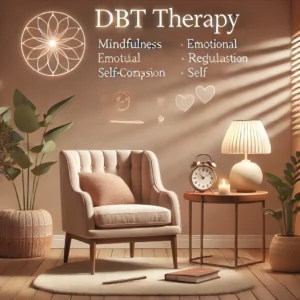
by terenceadmin | Dec 6, 2024 | uncategorized
10 Reasons to Use DBT Therapy: Unlocking a Path to Emotional Balance
Dialectical Behavior Therapy (DBT) is a transformative, evidence-based approach that helps individuals build healthier emotional responses, improve relationships, and find balance in their lives. Originally developed by Dr. Marsha Linehan for individuals with Borderline Personality Disorder (BPD), DBT therapy has since evolved to address various mental health conditions. Whether in person or through DBT online, its effectiveness lies in its structured approach to fostering emotional regulation, mindfulness, interpersonal skills, and distress tolerance.
If you’re considering starting therapy or exploring new approaches, here are 10 compelling reasons why DBT therapy might be the right fit for you.
1. Effective for Managing Emotional Dysregulation
One of the hallmark benefits of DBT therapy is its focus on helping individuals manage intense emotions. DBT equips clients with practical skills to identify, understand, and regulate emotions that might otherwise feel overwhelming. Whether dealing with chronic anger, sadness, or anxiety, DBT provides tools to regain emotional balance.
2. Addresses a Wide Range of Mental Health Issues
While initially created for BPD, DBT is now widely used for treating various conditions, including:
- Anxiety
- Depression
- Post-Traumatic Stress Disorder (PTSD)
- Eating disorders
- Substance use disorders
In both traditional and DBT online formats, its versatility makes it a go-to choice for individuals seeking comprehensive mental health support.
3. Emphasises Mindfulness
Mindfulness, a cornerstone of DBT therapy, helps individuals become more aware of their thoughts, emotions, and surroundings. By practicing mindfulness, clients learn to live in the present moment and reduce reactive tendencies. This skill is particularly helpful for reducing anxiety and stress, improving overall well-being.

Find the light within! DBT therapy and DBT online provide the tools to transform emotional struggles into a journey of growth and balance. Start your healing today!
4. Offers a Structured and Skills-Based Approach
DBT is unique in its structured framework, which includes four key modules:
- Mindfulness: Cultivating present-moment awareness.
- Distress Tolerance: Developing resilience in high-stress situations.
- Emotion Regulation: Managing emotional responses effectively.
- Interpersonal Effectiveness: Building healthy relationships.
Whether you attend in-person sessions or participate in DBT online, the structured approach ensures that you gain practical, actionable skills for your daily life.
5. Proven Track Record of Success
Numerous studies have demonstrated the effectiveness of DBT in improving mental health outcomes. For individuals with BPD, research shows that DBT therapy significantly reduces suicidal behaviors and emotional distress. Additionally, clients with depression, anxiety, and other conditions report improved emotional stability and quality of life after completing DBT programs.
6. Focuses on Building Resilience in Crisis
Life’s challenges can feel overwhelming, but DBT teaches clients how to navigate crises without resorting to harmful behaviors. The distress tolerance module equips individuals with tools like radical acceptance, self-soothing techniques, and distraction strategies to handle difficult moments. This resilience extends beyond therapy, empowering clients to face life’s unpredictability with confidence.
7. Enhances Relationship Skills
Healthy relationships are essential for mental well-being, and DBT dedicates an entire module to improving interpersonal effectiveness. Clients learn how to:
- Set boundaries.
- Communicate needs assertively.
- Resolve conflicts constructively.
Whether you’re managing personal relationships or professional dynamics, the skills gained through DBT therapy can lead to stronger, more fulfilling connections.
8. Accessible Through DBT Online
The flexibility of DBT online programs makes it easier than ever to access high-quality mental health support. Online therapy offers the same structured approach as in-person sessions, making it ideal for individuals with busy schedules, mobility issues, or those living in remote areas. With virtual platforms, you can experience the benefits of DBT from the comfort of your home.
9. Tailored to Individual Needs
DBT recognizes that everyone’s journey is unique. Therapy often combines group skills training with one-on-one sessions, where therapists help clients apply DBT principles to their specific circumstances. This personalized approach ensures that DBT therapy meets the individual’s goals and challenges, fostering meaningful progress.
10. Promotes Long-Term Change
Unlike some short-term therapies that focus solely on symptom relief, DBT aims to create lasting change. The skills learned in DBT therapy are designed to become lifelong tools for managing emotions, improving relationships, and navigating challenges. This long-term focus helps clients build a foundation for sustained emotional health and well-being.
How to Start Your DBT Journey
If these reasons resonate with you, consider exploring your options for DBT therapy. Whether you prefer face-to-face sessions or the convenience of DBT online, here’s how to get started:
- Research Providers: Look for licensed therapists trained in DBT.
- Evaluate Your Needs: Decide whether in-person or online therapy suits your lifestyle.
- Ask Questions: Inquire about the therapist’s experience and the program structure.
- Commit to the Process: DBT requires active participation, so be ready to engage with the materials and exercises.
Why Choose DBT Online?
For many individuals, DBT online offers unparalleled flexibility and accessibility. Virtual sessions eliminate the need for travel, provide more scheduling options, and allow clients to participate from anywhere. Additionally, online platforms often include digital tools, like worksheets and guided practices, to enhance the therapeutic experience.
Final Thoughts
Whether you’re struggling with emotional regulation, interpersonal challenges, or other mental health concerns, DBT therapy offers a proven, practical path to healing. With its focus on mindfulness, resilience, and skill-building, DBT equips clients with the tools they need to lead more balanced, fulfilling lives. And with the availability of DBT online, accessing this transformative therapy has never been easier.
If you’re ready to take control of your emotional health, consider starting your DBT journey today. The path to emotional well-being begins with the first step. Let DBT guide you toward a brighter, more balanced future.

by terenceadmin | Nov 14, 2024 | uncategorized
Dialectical Behavior Therapy, or DBT, has gained popularity as a structured and effective approach for managing a variety of mental health conditions. Originally developed to help individuals with borderline personality disorder (BPD), DBT therapy now offers coping tools for a broader audience, including those dealing with anxiety, depression, and stress. Whether you’re attending in-person sessions or exploring online DBT, here are ten essential DBT therapy tips to help you along your journey.
1. Practice Mindfulness Regularly
Mindfulness is a cornerstone of DBT therapy. By focusing on the present moment, you can manage overwhelming emotions and improve your concentration. Mindfulness is about observing your feelings, thoughts, and physical sensations without judgment. You can integrate it into daily activities like eating, showering, or walking by simply paying attention to each sensation. Try setting aside a few minutes each day to practice mindfulness—it can make a big difference.
2. Set Realistic Goals with SMART Criteria
In DBT, goal-setting is crucial for progress. The SMART criteria—Specific, Measurable, Achievable, Relevant, and Time-bound—helps you establish realistic goals that you’re more likely to achieve. For example, instead of setting a vague goal like “reduce stress,” try something specific like “practice deep breathing exercises for five minutes, three times a week.” With online DBT, you can often track your goals through worksheets and apps, making it easier to monitor progress.
3. Use Radical Acceptance to Reduce Suffering
Radical acceptance is a powerful tool in DBT therapy. It means accepting things as they are, rather than how you wish they were. This doesn’t mean you agree with or approve of the situation, but by accepting reality, you reduce additional emotional pain. Practice radical acceptance when faced with uncontrollable situations to cultivate peace and focus on things within your control.
4. Take Advantage of Online DBT Resources
The flexibility of online DBT has made therapy more accessible than ever. Many platforms offer virtual sessions, video lessons, and even downloadable worksheets to reinforce DBT skills. Whether you’re looking for individual therapy or group sessions, online DBT can be a practical choice, especially if in-person options aren’t available in your area. It also allows you to practice skills in the environment where you’ll be using them—your everyday life.

An inviting therapy room designed for DBT, with soft lighting, cozy seating, and mindfulness tools, creating a serene space for emotional growth and mental health support.
5. Practice Opposite Action to Manage Emotions
Opposite Action is a unique skill in DBT that helps you manage difficult emotions by acting opposite to what your feelings tell you. For instance, if you’re feeling angry, try to engage in a compassionate or positive action, such as writing a gratitude list. This technique works because actions can influence emotions. Next time you feel a challenging emotion, consider how the opposite action could alter your perspective.
6. Build a Crisis Survival Kit
When emotions become overwhelming, it helps to have a crisis survival kit—a collection of items and practices that can calm you in the moment. Your kit might include a list of coping statements, photos that evoke happy memories, or a playlist of calming music. Both in-person and online DBT therapists encourage creating a personalized kit to manage intense moments effectively.
STOP stands for Stop, Take a Step Back, Observe, and Proceed Mindfully. This DBT skill is especially useful in stressful or high-stakes situations where emotional regulation is essential. By pausing and observing your feelings, thoughts, and surroundings, you avoid reactive behaviors that you might later regret. This skill is easy to remember and can be practiced anywhere, making it perfect for both in-person and online DBT contexts.
8. Practice Self-Compassion to Support Progress
DBT therapy emphasizes self-compassion and understanding. Self-compassion involves being kind to yourself, especially during challenging moments. Many people find self-criticism comes easily, but this mindset can hinder progress in therapy. Replace self-critical thoughts with affirmations like “I am doing my best” or “I am worthy of kindness.” Online DBT programs often include modules or exercises that focus on building self-compassion, which can further reinforce your growth.
9. Improve Relationships with DEAR MAN
The DEAR MAN technique is part of the DBT module on interpersonal effectiveness and is designed to help you communicate assertively. DEAR MAN stands for Describe, Express, Assert, Reinforce, Mindful, Appear Confident, and Negotiate. By following these steps, you can improve communication, strengthen relationships, and advocate for your needs without escalating conflicts. Many online DBT platforms provide worksheets and examples to help you practice DEAR MAN effectively.
10. Celebrate Small Wins to Stay Motivated
Change is often slow in DBT therapy, but celebrating small achievements can keep you motivated. Each time you complete a skill or make a positive change, acknowledge it. These small wins accumulate and build your confidence in the DBT process. Whether you’re working with an in-person or online DBT therapist, reflecting on progress, no matter how small, reinforces a positive mindset and boosts commitment.
Final Thoughts on DBT Therapy
DBT therapy offers practical and actionable tools to help manage intense emotions, improve relationships, and enhance overall mental health. With the rise of online DBT, therapy is now more accessible and adaptable to diverse needs. Remember, DBT skills require practice and patience, so give yourself time to incorporate these techniques into your life. By following these tips, you’ll be better equipped to handle life’s challenges with resilience and balance.
SEO Optimized Content Recap:
Keywords:
- Primary: DBT Therapy, Online DBT
- Secondary: Mindfulness, Radical Acceptance, Emotional Regulation, Interpersonal Effectiveness, Self-Compassion, Opposite Action

by terenceadmin | Aug 14, 2024 | uncategorized
Self-harm is a deeply troubling behavior that affects countless individuals, often as a way to cope with overwhelming emotions. Whether you’re seeking to help yourself or support someone else, knowing how to prevent self-harm is crucial. This blog post will explore three top tips to help manage these impulses, informed by the principles of Dialectical Behavior Therapy (DBT), a leading therapeutic approach to treating self-harm. If you’re looking for professional support, consider resources like DBT London, DBT Therapy, or online therapy options to find the right help for your needs.
1. Develop Distress Tolerance Skills
One of the core components of DBT is building distress tolerance skills. These are crucial for managing the intense emotions that often lead to self-harm. Instead of turning to self-injury, these skills help individuals find healthier ways to cope with distress.
- Tip: Create a “Distress Tolerance Toolbox” filled with activities or items that can distract or soothe you when you’re feeling overwhelmed. This could include things like a stress ball, a favorite book, or a list of calming activities such as listening to music, going for a walk, or practicing deep breathing exercises.
For those in London or elsewhere, seeking professional guidance from a DBT therapist can be invaluable. DBT Therapy offers structured support and teaches these essential skills, which can make a significant difference in managing urges to self-harm.
2. Practice Emotional Regulation
Emotional regulation is another key element of DBT. It involves understanding and managing your emotions in a way that reduces the likelihood of self-harm. This is particularly important because many individuals who self-harm do so as a response to overwhelming negative emotions like anger, sadness, or frustration.
- Tip: Start by identifying your emotions and understanding what triggers them. Once you’re aware of your emotional patterns, work on changing your emotional responses. Techniques such as mindfulness, which is also a cornerstone of DBT, can be incredibly effective. By staying present and observing your emotions without judgment, you can reduce the intensity of these feelings and prevent them from escalating to the point of self-harm.
If you’re unsure how to begin, consider searching for “DBT Therapy Near Me” or exploring “DBT Online” options to find a therapist who can guide you through these techniques.
3. Build a Support Network
No one should have to face the challenges of self-harm alone. Building a strong support network is vital for prevention. Having people you can turn to when you’re struggling can provide the emotional support and encouragement needed to resist self-harm urges.
- Tip: Identify people in your life who are supportive and understanding, whether they are friends, family members, or professionals. It might also be helpful to connect with a DBT therapist who can offer consistent support and guidance. If in-person therapy isn’t feasible, there are many DBT Online options available, which can be just as effective.
Your therapist can help you develop a crisis plan, which involves identifying who to contact and what to do when you feel the urge to self-harm. This plan should include the contact information for your therapist, local crisis lines, and any other resources you find helpful.
Seeking Professional Help
Preventing self-harm is not just about learning new skills but also about receiving the right support. At DBT London, our team of experienced therapists is dedicated to helping individuals navigate these challenges through DBT Therapy. Whether you’re looking for “DBT Therapy Near Me” or prefer “DBT Online,” finding the right therapist is crucial in your journey to recovery.
Consider reaching out to My
who can offer personalized support tailored to your specific needs. With the right guidance and resources, it’s possible to build a life worth living, free from the cycle of self-harm.
Final Thoughts
Self-harm is a complex and deeply personal issue, but with the right strategies and support, it can be managed effectively. By developing distress tolerance skills, practicing emotional regulation, and building a strong support network, you can significantly reduce the risk of self-harm. Remember, you don’t have to go through this alone. Whether it’s through DBT London, DBT Therapy Near Me, or DBT Online, help is available to guide you every step of the way.
If you or someone you know is struggling with self-harm, please don’t hesitate to seek professional help. The sooner you reach out, the sooner you can begin your journey toward healing.

by terenceadmin | May 15, 2024 | uncategorized
Dialectical Behavior Therapy (DBT) has emerged as a leading treatment for various mental health conditions, including borderline personality disorder, anxiety, depression, and more. DBT combines cognitive-behavioral techniques with mindfulness practices to help individuals manage their emotions, build healthy relationships, and improve their overall well-being. For those searching for “DBT London,” “DBT Online,” or simply “DBT therapy,” this blog post will guide you through the benefits of DBT, how to access it in London, and the advantages of online therapy options.
Understanding DBT Therapy
Dialectical Behavior Therapy (DBT) was developed in the late 1980s by Dr. Marsha Linehan. It was initially designed to treat borderline personality disorder (BPD) but has since been adapted to address various mental health issues. DBT is a structured, evidence-based approach that focuses on four core skill sets:
- Mindfulness: Enhancing the ability to be present and fully engaged in the current moment.
- Distress Tolerance: Developing strategies to tolerate and survive crises without resorting to harmful behaviors.
- Emotion Regulation: Learning to manage and change intense emotions that are causing problems in one’s life.
- Interpersonal Effectiveness: Building skills to communicate effectively and maintain healthy relationships.
Why Choose DBT Therapy?
DBT therapy offers a range of benefits, including:
- Structured Approach: The structured nature of DBT provides a clear pathway for individuals to follow, making the therapeutic process more predictable and manageable.
- Skill Development: DBT emphasizes skill-building, providing practical tools that can be applied in everyday life to manage emotions and relationships.
- Holistic Care: DBT addresses the whole person, focusing not only on reducing symptoms but also on improving overall quality of life.
- Evidence-Based: Numerous studies have demonstrated the effectiveness of DBT in treating a variety of mental health conditions.
- DBT Services Overview: “For a detailed overview of our services, visit our DBT Services Overview.
Finding DBT Therapy in London
For those seeking “DBT London,” there are numerous options available. London is home to a variety of mental health professionals and clinics that specialize in DBT therapy. Here are some steps to help you find the right DBT therapy in London:
Research and Referrals
- Online Searches: Use search engines to find DBT therapists and clinics in London. Keywords such as “DBT London” or “DBT therapy in London” can yield numerous results.
- Professional Referrals: Ask your primary care physician, psychiatrist, or other mental health professionals for recommendations.
- Mental Health Directories: Websites like Psychology Today and the British Association for Behavioural and Cognitive Psychotherapies (BABCP) offer directories of certified DBT therapists.Meet Our Therapists:Learn more about our team of experts on our Meet Our Therapists page.
Evaluating DBT Therapists and Programs
- Credentials: Ensure that the therapist is licensed and has specialized training in DBT.
- Experience: Look for therapists with experience treating your specific condition.
- Approach: Make sure the therapist’s approach aligns with your needs and preferences.
- Consultations: Many therapists offer initial consultations, allowing you to assess whether they are a good fit.
DBT Programs in London
London offers a variety of DBT programs, from individual therapy to comprehensive programs that include skills training groups, phone coaching, and therapist consultation teams. Some notable DBT programs in London include:
- DBT London: Specializing in providing personalized DBT therapy, DBT London offers both in-person and online options. Their team of accredited therapists is dedicated to helping clients achieve emotional resilience and stability.
- The Sloane Court Clinic: Located in Chelsea, this clinic offers a range of DBT services, including individual therapy and group skills training.
- The Priory Group: With several locations in and around London, The Priory Group provides comprehensive DBT programs tailored to individual needs.DBT Skills Training: Discover the skills we teach in our DBT Skills Training section.

The Rise of DBT Online Therapy
In recent years, online therapy has become an increasingly popular option, offering convenience and accessibility to those seeking mental health support. “DBT Online” is particularly beneficial for individuals who may have difficulty accessing in-person therapy due to location, mobility issues, or time constraints.
Advantages of DBT Online
- Accessibility: Online therapy makes DBT accessible to individuals who live in remote areas or have limited access to transportation.
- Convenience: Online sessions can be scheduled at times that are convenient for you, reducing the need to take time off work or arrange childcare.
- Privacy: Online therapy offers a high level of privacy, allowing you to participate in sessions from the comfort of your own home.
- Continuity of Care: For individuals who travel frequently or have unpredictable schedules, online therapy ensures that they can maintain continuity of care.
How to Access DBT Online
- DBT London: DBT London offers comprehensive online DBT therapy, providing the same level of personalized care as their in-person services. Their online platform is secure and user-friendly, ensuring a seamless therapy experience.
- Online Therapy Platforms: Websites like BetterHelp and Talkspace connect you with licensed therapists who specialize in DBT and offer online sessions.
- Local Clinics: Many local clinics and therapists now offer online therapy options. Check with DBT therapists in your area to see if they provide online services.Client Success Stories:Read inspiring testimonials on our Client Success Stories page.
Tips for Successful Online Therapy
- Set Up a Private Space: Ensure that you have a quiet, private space for your therapy sessions to minimize distractions.
- Reliable Internet Connection: A stable internet connection is crucial for uninterrupted sessions.
- Consistency: Schedule your sessions at regular intervals and make them a priority in your routine.
- Engagement: Actively participate in your sessions and practice the skills you learn in your daily life.
Conclusion
Whether you are looking for “DBT London,” “DBT Online,” or “DBT therapy,” there are numerous options available to help you on your journey towards emotional well-being. DBT is a powerful, evidence-based therapy that can provide you with the skills and support you need to manage your emotions, build healthy relationships, and improve your quality of life. By exploring both in-person and online therapy options, you can find the approach that best suits your needs and begin your path to recovery today.
Remember, taking the first step towards seeking help is a significant milestone. With the right support and commitment, you can achieve lasting positive change through DBT therapy. Whether you choose in-person sessions in London or the flexibility of online therapy, DBT offers a structured and effective way to enhance your mental health and overall well-being.

by terenceadmin | Apr 30, 2024 | uncategorized
How to Find DBT Therapy Near You
Dialectical Behavior Therapy (DBT) is a powerful evidence-based treatment designed to help individuals manage intense emotions and improve interpersonal relationships. If you’re searching for “DBT therapy near me,” this guide will help you understand what DBT involves and how to find skilled DBT therapists in your area.
DBT therapy, or Dialectical Behavior Therapy, is a form of cognitive-behavioral therapy that focuses on teaching patients skills to cope with stress, regulate emotions, and improve relationships with others. Originally developed to treat borderline personality disorder, it has also been proven effective for treating depression, anxiety, PTSD, and other emotional disorders. Understanding the fundamentals of DBT is crucial before beginning your search for a therapist.
Finding DBT Therapy Near Me: A Step-by-Step Guide
- Research Local Mental Health Clinics: Start by searching online for mental health clinics and services that offer “DBT therapy near me.” Many clinics provide detailed descriptions of their services and the qualifications of their therapists.
- Use Specialized Therapist Directories: Websites like Psychology Today and GoodTherapy are valuable resources where you can filter your search for therapists who specialize in DBT. These directories allow you to search by location, ensuring you find “DBT therapists near me.”
- Check Credentials and Certifications: When considering therapists, verify their credentials. A qualified DBT therapist should have specific training and certification in Dialectical Behavior Therapy.
The Benefits of DBT Therapy
Engaging in DBT therapy can lead to many improvements in your mental health. Here are some key benefits:
- Emotional Regulation: Learn techniques to control intense emotions that seem overwhelming.
- Distress Tolerance: Gain skills to tolerate pain in difficult situations, not just change it.
- Mindfulness: Become more present in the moment, which can help in all aspects of life.
- Interpersonal Effectiveness: Enhance your ability to communicate effectively and assert your needs while maintaining respect for yourself and others.
What to Expect From Sessions
DBT therapy typically involves both individual therapy sessions and group skills training classes. This comprehensive approach helps patients apply the learned skills in various aspects of their lives. Knowing what to expect can help you feel more prepared and comfortable with the process.
Case Study: Emily’s Journey
Background Emily, a 29-year-old software developer, had struggled with severe anxiety and emotional dysregulation for years. Her difficulties in managing stress and interpersonal conflicts at work were affecting her job performance and personal life. After a particularly challenging period, Emily sought help and was referred to a DBT program by her therapist.
Challenges Upon starting DBT, Emily faced numerous challenges:
- Emotional Instability: Frequent emotional spirals and intense anxiety episodes.
- Interpersonal Issues: Struggles with communication that led to conflicts with colleagues and family.
- Stress Management: Difficulty coping with normal levels of job stress, leading to absenteeism and decreased productivity.
DBT Intervention Emily’s DBT program was structured around the four core modules:
- Mindfulness: She learned to observe and describe her thoughts and feelings without judgment, which helped her gain a greater awareness of her mental state.
- Distress Tolerance: Emily was taught techniques for surviving crisis situations and accepting life as it comes, reducing her impulse to react negatively to stress.
- Emotion Regulation: She learned to manage and change intense emotions that were causing problems in her life.
- Interpersonal Effectiveness: Emily developed skills to express her beliefs and needs, set limits, and negotiate solutions while maintaining self-respect and relationships with others.
Results After six months of intensive DBT, Emily reported significant improvements:
- Reduced Anxiety Levels: A noticeable decrease in the frequency and intensity of her anxiety episodes.
- Improved Relationships: Enhanced communication skills led to fewer conflicts and more supportive relationships, both professionally and personally.
- Better Performance at Work: With improved emotional regulation and stress management, Emily became more productive and engaged at her job.
Conclusion DBT provided Emily with the tools to transform her approach to challenges, leading to a more stable and fulfilling life. Her case is a testament to the effectiveness of DBT in providing strategies for individuals struggling with emotional regulation and interpersonal difficulties.
Choosing the Right DBT Therapist
Finding the right therapist is crucial to your therapeutic journey. Consider setting up initial consultations with several DBT therapists to discuss your goals and see if their style aligns with your needs. This initial interaction can provide a good indicator of whether the therapist is a fit for you.
Finding the right “DBT therapy near me” can be a life-changing step toward better mental health. By understanding what to look for in a DBT therapist and how to find them, you are well on your way to beginning your journey toward recovery and emotional well-being.

by terenceadmin | Apr 29, 2024 | uncategorized
Dialectical Behavior Therapy (DBT): Transformative Treatment for Emotional Balance
Dialectical Behavior Therapy (DBT) has emerged as a highly effective treatment modality for individuals struggling with emotional regulation, offering a pathway to enhanced mental health and well-being. Originating in the late 1980s by psychologist Marsha M. Linehan, DBT was initially designed to treat Borderline Personality Disorder (BPD). It has since evolved to address a variety of mental health issues, including anxiety, depression, and PTSD. This post explores the core components of DBT, its benefits, and how to find DBT services in London.
What is Dialectical Behavior Therapy?
DBT Therapy is a form of cognitive-behavioral therapy that emphasizes the psychosocial aspects of treatment. The word “dialectical” refers to the process of holding two seemingly opposite perspectives at once and working on integrating them. DBT helps patients learn to manage negative emotions and reduce conflict in relationships through a skills-based approach.
Core Components of DBT
DBT incorporates four main sets of behavioral skills:
- Mindfulness: The practice of being fully aware and present in the moment.
- Distress Tolerance: Increasing one’s tolerance of negative emotion, rather than trying to escape from it.
- Emotion Regulation: Strategies to manage and change intense emotions that are causing problems in a person’s life.
- Interpersonal Effectiveness: Techniques to communicate with others in a way that is assertive, maintains self-respect, and strengthens relationships.
Benefits of DBT Therapy
Research has shown that DBT can significantly improve outcomes for people with complex emotional disorders. Benefits include reduced symptoms of anxiety, decreased depressive symptoms, and an overall improvement in quality of life. Patients often report better emotional control, enhanced communication skills, and improved relationships.
DBT Therapy Sessions: What to Expect
DBT treatment typically involves a combination of individual therapy sessions, group skills training, and in some cases, phone coaching. Individual sessions focus on addressing behaviors and obstacles to goals, while group sessions teach skills across the four modules. This dual approach ensures that patients learn practical skills in a supportive setting and apply them in their real lives.
Finding DBT Therapy in London: DBT London
For residents of London or those seeking DBT services in the UK, there are several reputable clinics and practitioners that offer Dialectical Behaviour Therapy. DBT London, for example, is a well-known provider that specializes in comprehensive DBT treatment. They offer tailored services that cater to a wide range of needs, from full DBT programs to specific modules like mindfulness and distress tolerance.
The Importance of Choosing a Qualified DBT Therapist
Selecting a qualified DBT therapist is crucial. Look for practitioners who are specifically trained and certified in Dialectical Behaviour Therapy. Many therapists in London also offer introductory sessions, which can help potential clients feel more comfortable and ensure the therapy is a good fit.
Conclusion: Why DBT Could Be the Right Choice
Dialectical Behavior Therapy offers a promising option for anyone looking to manage their emotional health through a structured, skills-based approach. Whether you’re dealing with mood disorders, emotional regulation challenges, or relationship issues, DBT provides tools that can promote significant and lasting change.
For those in London and beyond, DBT London represents just one of the many high-quality options available to begin this transformative journey. Embracing the principles of DBT can lead to profound personal growth and a more harmonious life.
If you need urgent help out of hours call the NHS here.









